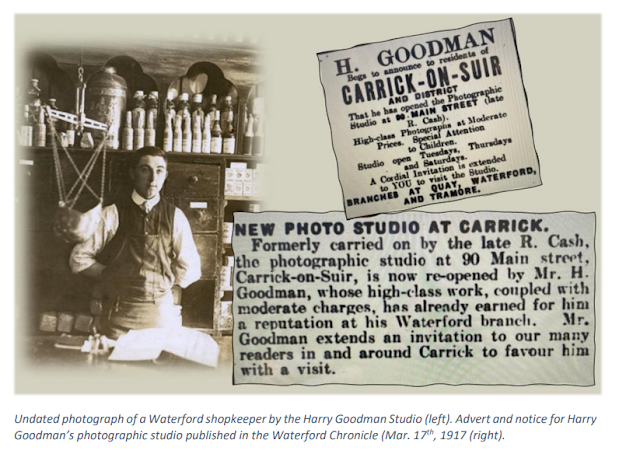The Waterford Archaeological and Historical Society 2022 – 2023 lecture series concludes at 8 pm on Friday, May 26th in St Patrick’s Gateway Centre, Waterford (Eircode X91 YX61) when Dr Trisha Oakley Kessler, research associate, Woolf Institute, Cambridge, will deliver a talk titled ‘Jewish Footprints in Provincial Ireland and the Minority Experience’.
Harry Goodman ran a photographic studio in Waterford from 1900, branching out to open other studios in Tramore and Carrick-on-Suir over the following decade. This undated photograph of a shopkeeper in Waterford could well be that of Isaac Levi in his shop on John Street. Levi’s wife, Florie Goldring, was, according to the 1901 Irish census, also a photographer and most likely working with Goodman. She may have taken this photograph. Seemingly, Goodman was successful in his profession, photographing Irish men, women and children. By doing so, he created a visual recording of provincial Irish lives that hopefully have been passed down the generations. Yet, ironically, the only visible artefacts of Goodman’s life in Waterford are his embossed signature on this photograph and several announcements in the local paper regarding his studios. This raises the question of why there are so few traces of Jewish lives outside the larger communities in Dublin, Belfast, Cork and Limerick.
Dr Trisha Oakley Kessler’s talk will map the presence of Jews in provincial Ireland in the early decades of the twentieth century to explore how they negotiated belonging and identity during a period in which the Irish people were also navigating political, economic and social change. Exploring the Jewish minority experience highlights concepts of agency, visibility and invisibility. In addition, it examines minority strategies as Jews engaged in new encounters to find a sense of place in Ireland.
 Dr Trisha Oakley Kessler explores the Irish economy through a socio-cultural lens to understand everyday life, racism, nationalism and gender in Irish history. Her doctoral thesis from University College Dublin explored political and economic change in 1930s Ireland through the prism of three factories established in provincial Ireland by Jewish refugees, which helped to build a new ladies' hat industry. How these factories came into existence, the economic networks that enabled them to arrive, the challenges they faced entering the Irish economy and their political and economic impact offer a prism to explore identity, modernity, belonging and industrial change. She is interested in the workings and the shifting meanings of factories in twentieth-century Irish provincial life.
Dr Trisha Oakley Kessler explores the Irish economy through a socio-cultural lens to understand everyday life, racism, nationalism and gender in Irish history. Her doctoral thesis from University College Dublin explored political and economic change in 1930s Ireland through the prism of three factories established in provincial Ireland by Jewish refugees, which helped to build a new ladies' hat industry. How these factories came into existence, the economic networks that enabled them to arrive, the challenges they faced entering the Irish economy and their political and economic impact offer a prism to explore identity, modernity, belonging and industrial change. She is interested in the workings and the shifting meanings of factories in twentieth-century Irish provincial life.Her research interests also focus on the Irish-Jewish community and Irish-Jewish encounters in Ireland and the diaspora. Working with ‘ego documents’, autobiographical writing including memoirs, private correspondence and oral histories, she is working on a social-cultural history of Jews in the Irish economy.
Trisha has taught on a Special Subject Paper, 'An alternative history of Ireland: religious minorities and identity in the 26 counties, 1900-1959' at the Faculty of History, University of Cambridge, where she also supervises undergraduates on modern Irish history. In addition, Trisha is a Co-Convenor of the Cambridge Modern Irish History Seminar. She is a Research Associate at the Woolf Institute Cambridge and a Non-Stipendiary Teaching Research Fellow at the Herzog Centre, Trinity College Dublin.


No comments:
Post a Comment